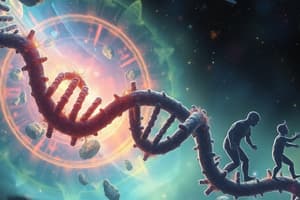Podcast
Questions and Answers
What is evolution in biology?
What is evolution in biology?
Evolution in biology is the process by which populations of organisms change over time, leading to the development of new species from older ones.
Name three mechanisms that can drive evolution.
Name three mechanisms that can drive evolution.
Natural selection, genetic drift, and gene flow.
What is natural selection and how does it work?
What is natural selection and how does it work?
Natural selection is the process by which certain traits become more common in a population over time because they confer a survival advantage. Individuals with these advantageous traits are more likely to survive and reproduce.
Explain genetic drift in evolution.
Explain genetic drift in evolution.
What is gene flow and how does it contribute to evolution?
What is gene flow and how does it contribute to evolution?
How does evolution lead to the development of new species?
How does evolution lead to the development of new species?
What is a phylogenetic tree used for?
What is a phylogenetic tree used for?
Explain allopatric speciation.
Explain allopatric speciation.
How does sympatric speciation differ from allopatric speciation?
How does sympatric speciation differ from allopatric speciation?
What is parapatric speciation?
What is parapatric speciation?
Name three mechanisms through which evolution can occur.
Name three mechanisms through which evolution can occur.
Why is understanding evolution crucial in biology?
Why is understanding evolution crucial in biology?
Flashcards are hidden until you start studying
Study Notes
Evolution in Biology
Evolution is the driving force behind the tremendous biological diversity on Earth. It is the process by which populations of organisms change over time, leading to the development of new species from older ones.
Themes and Concepts of Biology
Biology is a vast field that encompasses many branches and subdisciplines, such as molecular biology, microbiology, neurobiology, zoology, and botany. At the core of biology is the concept of evolution, which is the source of the diversity we see today.
Evolution as a Process
Evolution is characterized by gradual change in populations, leading to the development of new species from older ones. This change can occur through several mechanisms, including natural selection, genetic drift, and gene flow.
Natural Selection
Natural selection is the process by which certain traits become more common in a population over time because they confer a survival advantage. Individuals with these advantageous traits are more likely to survive and reproduce, passing on their traits to their offspring.
Genetic Drift
Genetic drift is the random fluctuation of gene frequencies in a population. It can lead to the fixation of certain traits, even if they do not confer any advantage.
Gene Flow
Gene flow occurs when individuals from one population interbreed with individuals from another population, introducing new genetic material into the population.
Evolutionary Relationships
The relationships between different species can be visualized using a tool called a phylogenetic tree. This tree shows the evolutionary history of species, with branches representing the divergence of different lineages.
Evolution and Speciation
Evolution can lead to the formation of new species from older ones. This process, known as speciation, can occur through several mechanisms, including allopatric speciation, sympatric speciation, and parapatric speciation.
Allopatric Speciation
Allopatric speciation occurs when two populations become geographically isolated from one another, leading to the development of new species through evolution.
Sympatric Speciation
Sympatric speciation occurs when two or more populations remain in the same geographic area, but still evolve into separate species due to reproductive isolation.
Parapatric Speciation
Parapatric speciation occurs when two populations remain in the same geographic area, but evolve into separate species due to a gradual shift in their geographic distribution.
In conclusion, evolution is a fundamental concept in biology, driving the development of new species and the tremendous biological diversity we see on Earth. It is a process that occurs through various mechanisms, such as natural selection, genetic drift, and gene flow. Understanding evolution is crucial for understanding the natural world and the diversity of life on our planet.
Studying That Suits You
Use AI to generate personalized quizzes and flashcards to suit your learning preferences.




